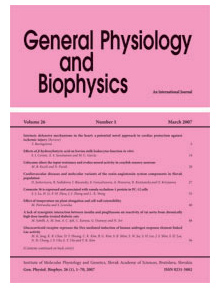Journal info
|
||
Select Journal
Journals
Bratislava Medical Journal Ekologia - Ecology Endocrine Regulations General Physiology and Biophysics 2025 2024 2023 2022 2021 2020 2019 2018 2017 2016 2015 2014 2013 2012 2011 2010 2009 2008 2007 Neoplasma Acta Virologica Studia Psychologica Cardiology Letters Psychológia a patopsych. dieťaťa Kovove Materialy-Metallic Materials Slovenská hudba 2025Webshop Cart
Your Cart is currently empty.
Info: Your browser does not accept cookies. To put products into your cart and purchase them you need to enable cookies.
General Physiology and Biophysics Vol.29, No.3, p.275–281, 2010 |
||
| Title: Exposure to fractionated dose of 60 Gy affects molecular response of HL-60 cells to irradiation | ||
| Author: Jiřina Vávrová, Aleš Tichý, Martina Řezáčová, Lenka Zárybnická, Zuzana Šinkorová and Jan Österreicher | ||
| Abstract: In this work we evaluated changes in molecular response of human promyelocyte leukemia cells HL-60 and HL-60-IR cells (HL-60 irradiated by 10 cycles of radiation with total dose of 60 Gy, given over a period of 3 months) to irradiation by the dose of 2 and 8 Gy. Analysis of CD11b and apoptosis by flow-cytometry revealed that on 3rd day after irradiation by 8 Gy the HL-60-IR are more resistant to radiation-induced apoptosis and more differentiated (increase in CD11b in non-apoptotic cells) than regular HL-60. We found that both types of cells have high basal level of phosphorylated extracellular signal-regulated kinases Erk1/2 . Irradiation induces decrease in Erk1/2 phosphorylation after 4 and 8 h in both cell types. However, in HL-60-IR cells Erk1/2 phosphorylation is restored faster than in HL-60. Also it was found that in contrary to HL-60 cells, the HL-60-IR cells react to 2 Gy irradiation by p53 independent increase in p21(WAF1/Cip1), and not by activation of checkpoint kinase Chk-2. Therefore we concluded that relatively high dose of radiation (6 Gy) does not lead after 10 repetitive irradiations to eradication of HL-60 cells, but instead increases their radioresistance, increases the ability to differentiate, alters MAPK response, increases amount of p21(WAF1/Cip1), and decreases induction of apoptosis by ionizing radiation. p21(WAF1/Cip1) might prevent apoptosis induction and trigger permanent cell-cycle arrest, which can also contribute to regression of this leukaemia after therapy. |
||
| Keywords: Ionizing radiation — Radioresistance — p21(WAF1/Cip1) — Erk1/2 — Apoptosis | ||
| Year: 2010, Volume: 29, Issue: 3 | Page From: 275, Page To: 281 | |
| doi:10.4149/gpb_2010_03_275 |
||
|
|
 download file download file |
|

